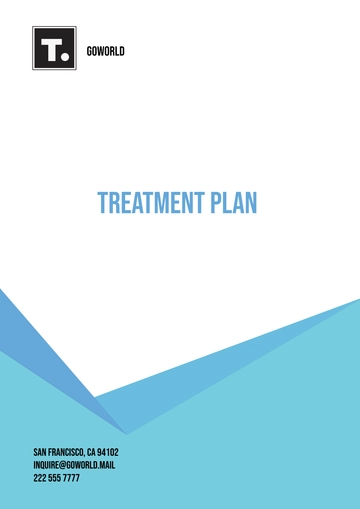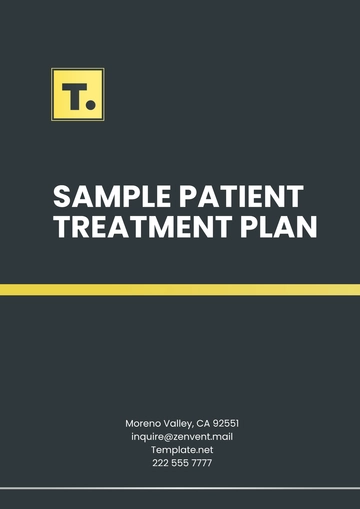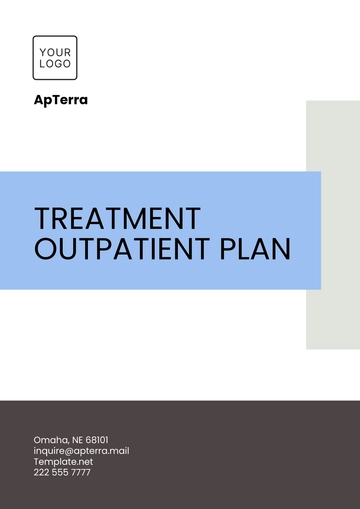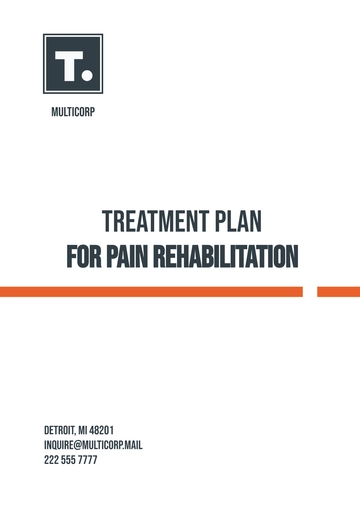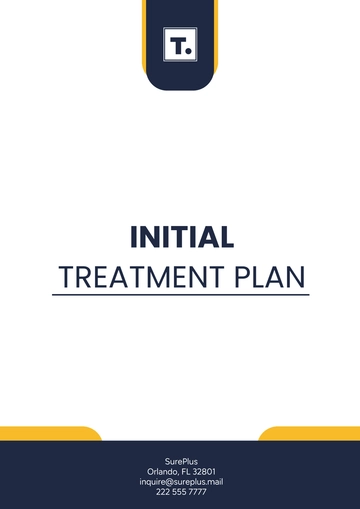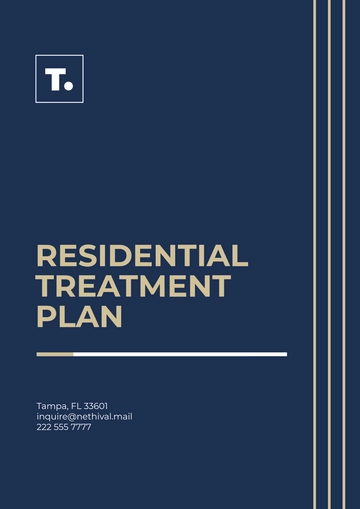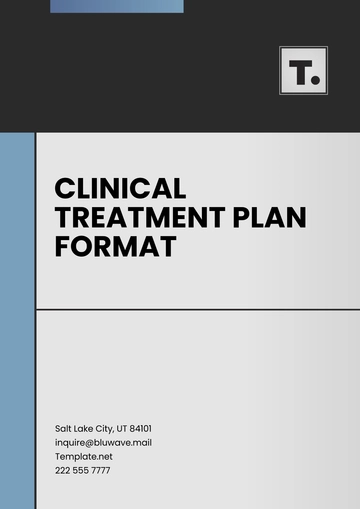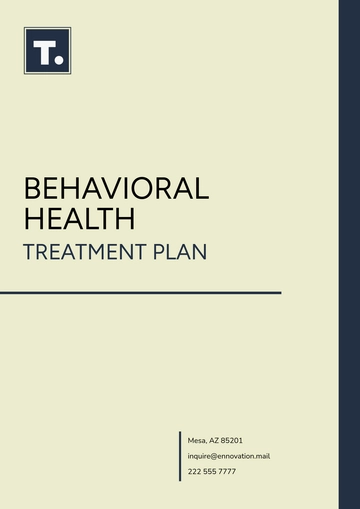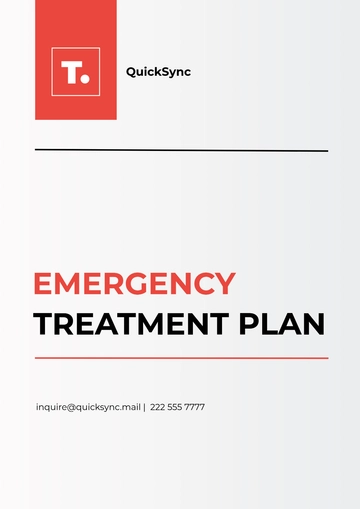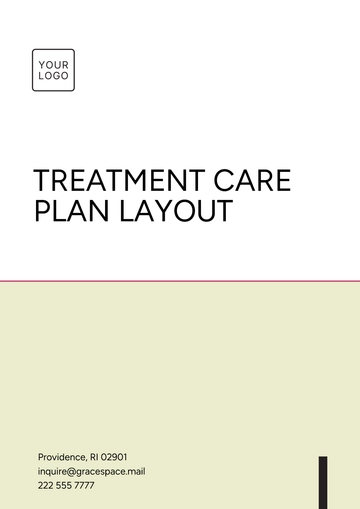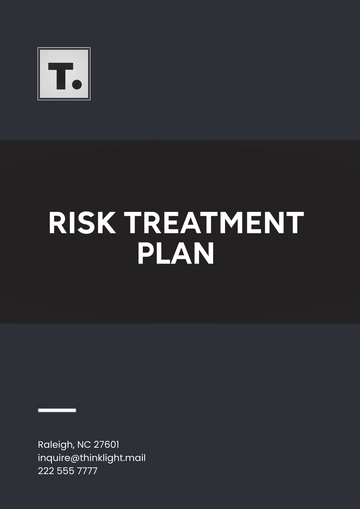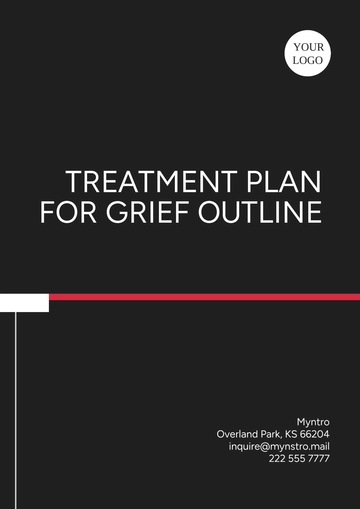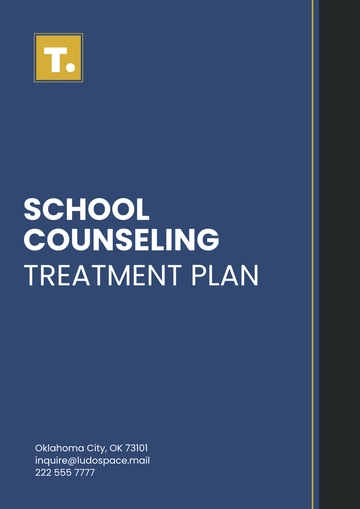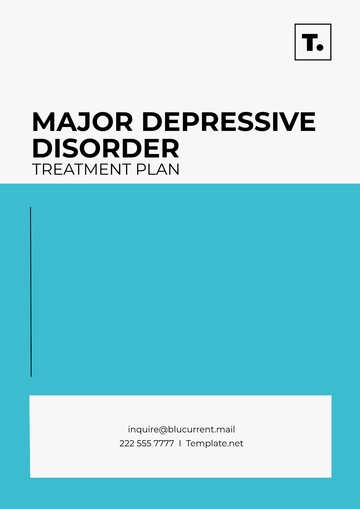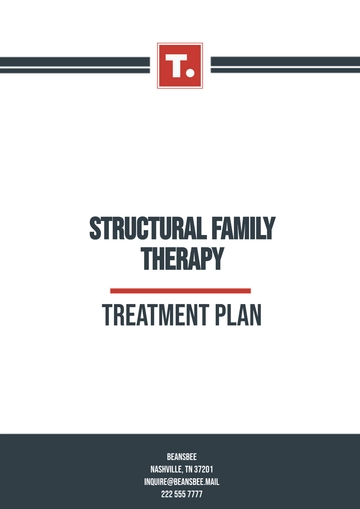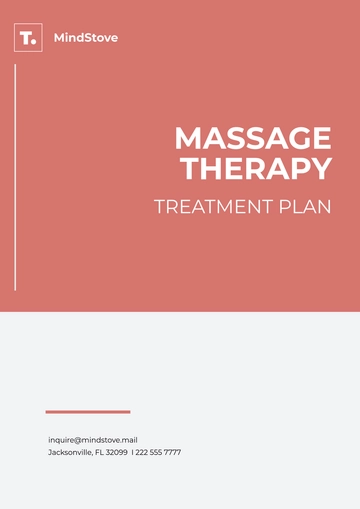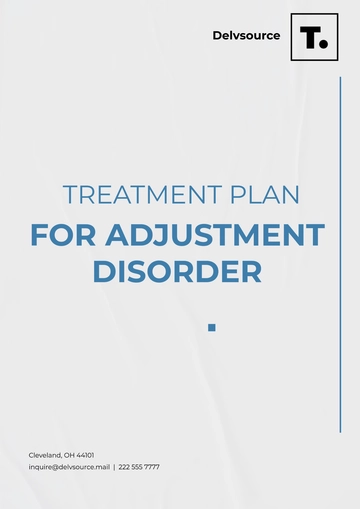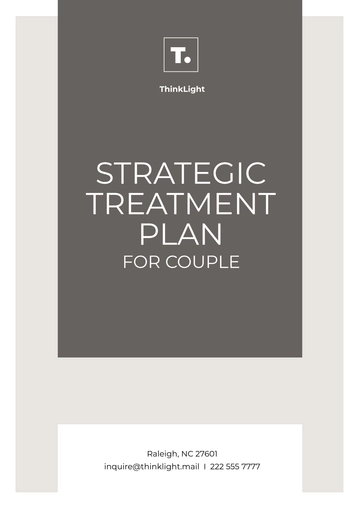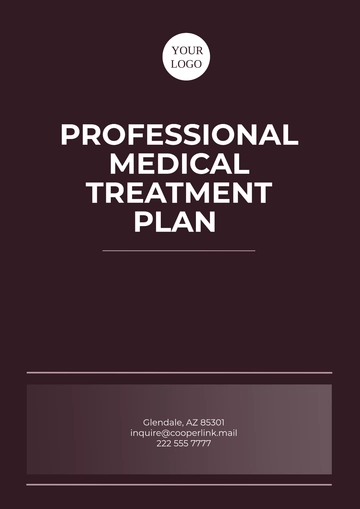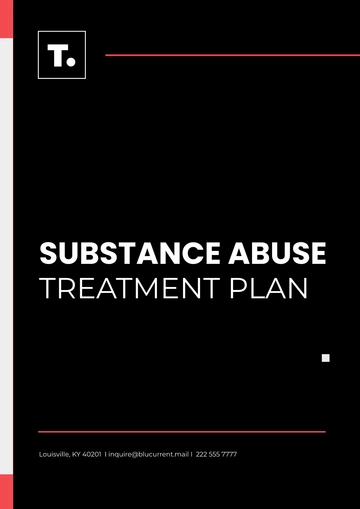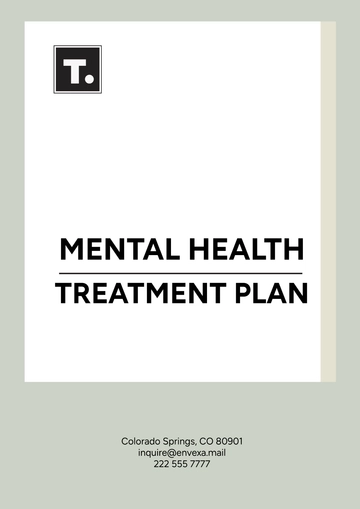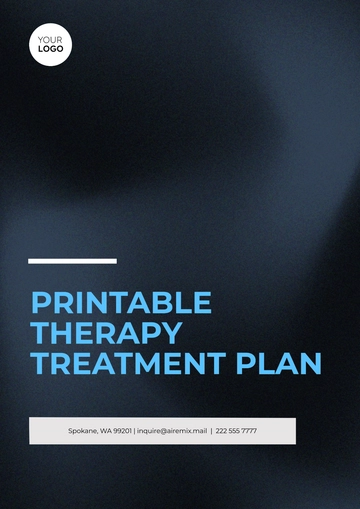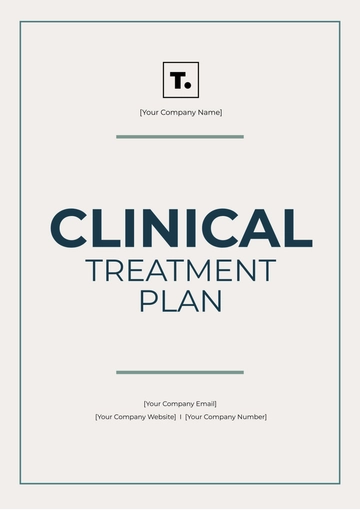Free Treatment Plan For Adjustment Disorder
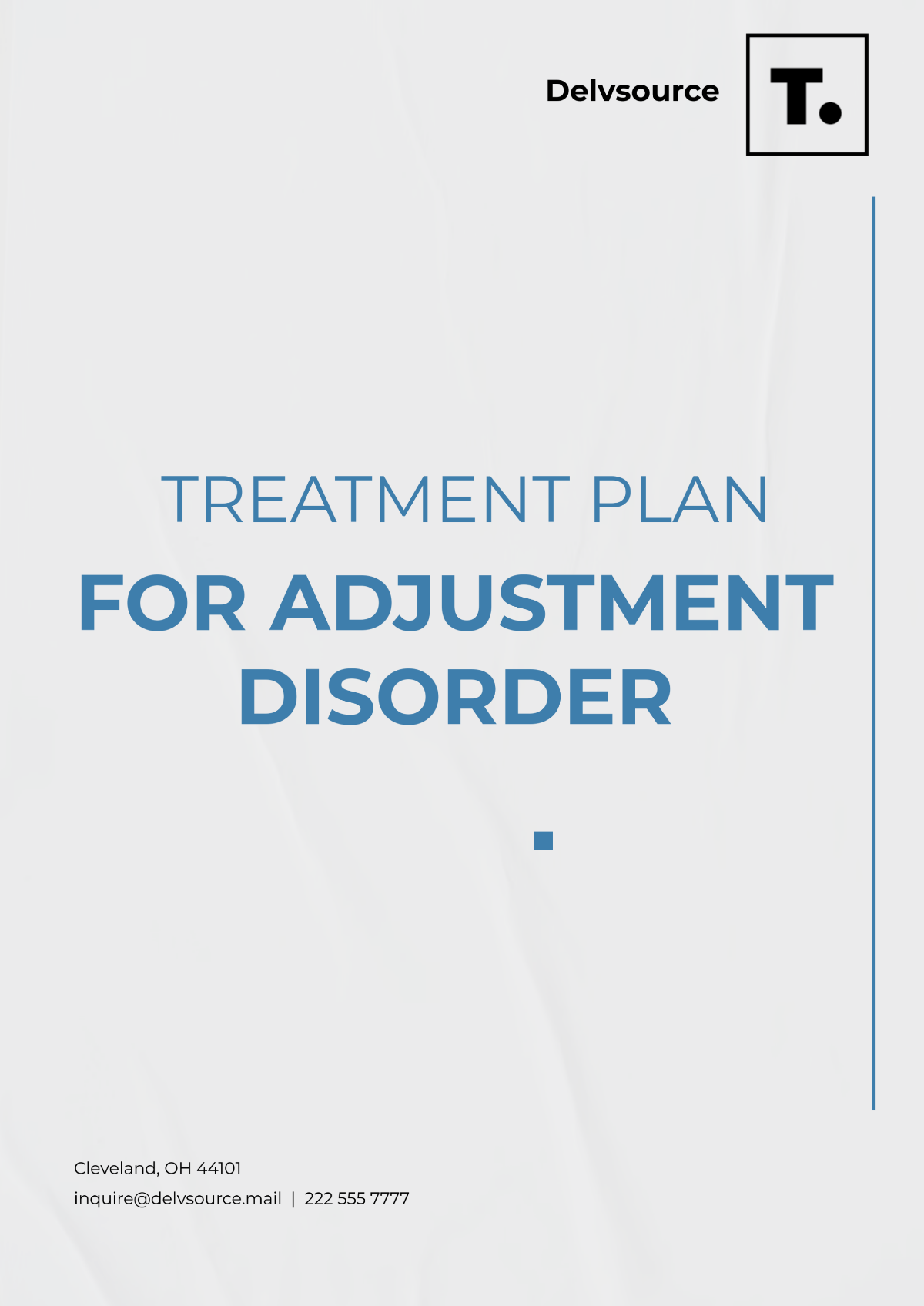
Prepared by: [Your Name]
I. Assessment and Diagnosis
Adjustment Disorder is a mental health condition characterized by significant emotional or behavioral symptoms that develop in response to identifiable stressors or life changes. These stressors can vary widely and may include relationship difficulties, job loss, financial problems, relocation, or traumatic events. Unlike other mental health disorders, Adjustment Disorder is time-limited and typically resolves once the individual adapts to or copes with the stressor.
The diagnostic process for Adjustment Disorder involves assessing the presence of specific criteria outlined in the Diagnostic and Statistical Manual of Mental Disorders (DSM-5). These criteria include the onset of emotional or behavioral symptoms within three months of the onset of the stressor, the presence of significant distress or impairment in social, occupational, or other important areas of functioning, and the absence of criteria for another mental disorder that may better explain the symptoms.
II. Treatment Goals
Alleviate symptoms of distress and improve coping mechanisms.
Enhance adaptive functioning and resilience in response to stressors.
Improve social support and interpersonal relationships.
Prevent escalation of symptoms and mitigate risk factors for long-term mental health complications.
III. Treatment Interventions
Intervention | Description |
|---|---|
Cognitive-Behavioral Therapy |
|
Supportive Psychotherapy |
|
Stress Management Techniques |
|
Social Support Enhancement |
|
Medication Management |
|
IV. Progress Monitoring
Regular monitoring of progress is essential to ensure the effectiveness of the treatment plan for Adjustment Disorder. This includes assessing the severity of symptoms, tracking improvements, and identifying any barriers to progress. Progress monitoring will be conducted through a combination of standardized measures and clinical interviews. These assessments will be scheduled at regular intervals throughout the treatment process to capture changes over time.
Collaboration with the client is integral to progress monitoring, as it allows for feedback on the effectiveness of interventions and facilitates the identification of any areas requiring further attention. By regularly reviewing progress and adjusting the treatment plan accordingly, we aim to optimize outcomes and promote the client's overall well-being.
V. Crisis Intervention
While the primary focus of treatment is on addressing the underlying issues contributing to Adjustment Disorder, it is essential to have a plan in place for managing crises or emergencies that may arise. A crisis intervention plan will be developed collaboratively with the client to outline specific steps to take in the event of worsening symptoms or imminent risk of harm.
Regular review and rehearsal of the crisis intervention plan will be conducted during therapy sessions to ensure that the client feels prepared and empowered to implement it effectively in times of crisis. By having a proactive approach to crisis management, we aim to minimize the impact of potential emergencies and promote the client's safety and well-being.
VI. Discharge Planning
Discharge planning is an essential component of the treatment process, focusing on the client's transition out of therapy and maintenance of progress achieved during treatment. A comprehensive discharge plan will be developed in collaboration with the client to ensure continuity of care and support beyond the therapy setting.
Follow-up appointments will be scheduled to monitor the client's long-term progress and address any emerging concerns or challenges. Additionally, the client will be provided with contact information for the therapist and instructions for seeking further assistance if needed after discharge. By facilitating a smooth transition out of therapy, we aim to promote sustained well-being and resilience in the client's ongoing journey.
VII. Documentation
Accurate and thorough documentation is essential for maintaining continuity of care, ensuring accountability, and meeting ethical and legal standards. Detailed records will be kept of assessment findings, treatment interventions, progress notes, and discharge summaries throughout the course of therapy.
Regular review and updating of documentation will be conducted to reflect changes in the client's status, treatment plan, and progress over time. This comprehensive record-keeping process serves as a valuable tool for informing clinical decision-making, facilitating communication with other healthcare providers, and ensuring the provision of high-quality care to the client.
- 100% Customizable, free editor
- Access 1 Million+ Templates, photo’s & graphics
- Download or share as a template
- Click and replace photos, graphics, text, backgrounds
- Resize, crop, AI write & more
- Access advanced editor
Support clients through transitional periods with the Treatment Plan For Adjustment Disorder Template offered by Template.net. This customizable, downloadable template is designed to provide structure and clarity in treatment planning. Editable in our AI Editor Tool, it enables you to adapt each plan to the unique needs of your clients. Ensure comprehensive, professional care with a printable format that guides every step of the treatment process.
You may also like
- Finance Plan
- Construction Plan
- Sales Plan
- Development Plan
- Career Plan
- Budget Plan
- HR Plan
- Education Plan
- Transition Plan
- Work Plan
- Training Plan
- Communication Plan
- Operation Plan
- Health And Safety Plan
- Strategy Plan
- Professional Development Plan
- Advertising Plan
- Risk Management Plan
- Restaurant Plan
- School Plan
- Nursing Home Patient Care Plan
- Nursing Care Plan
- Plan Event
- Startup Plan
- Social Media Plan
- Staffing Plan
- Annual Plan
- Content Plan
- Payment Plan
- Implementation Plan
- Hotel Plan
- Workout Plan
- Accounting Plan
- Campaign Plan
- Essay Plan
- 30 60 90 Day Plan
- Research Plan
- Recruitment Plan
- 90 Day Plan
- Quarterly Plan
- Emergency Plan
- 5 Year Plan
- Gym Plan
- Personal Plan
- IT and Software Plan
- Treatment Plan
- Real Estate Plan
- Law Firm Plan
- Healthcare Plan
- Improvement Plan
- Media Plan
- 5 Year Business Plan
- Learning Plan
- Marketing Campaign Plan
- Travel Agency Plan
- Cleaning Services Plan
- Interior Design Plan
- Performance Plan
- PR Plan
- Birth Plan
- Life Plan
- SEO Plan
- Disaster Recovery Plan
- Continuity Plan
- Launch Plan
- Legal Plan
- Behavior Plan
- Performance Improvement Plan
- Salon Plan
- Security Plan
- Security Management Plan
- Employee Development Plan
- Quality Plan
- Service Improvement Plan
- Growth Plan
- Incident Response Plan
- Basketball Plan
- Emergency Action Plan
- Product Launch Plan
- Spa Plan
- Employee Training Plan
- Data Analysis Plan
- Employee Action Plan
- Territory Plan
- Audit Plan
- Classroom Plan
- Activity Plan
- Parenting Plan
- Care Plan
- Project Execution Plan
- Exercise Plan
- Internship Plan
- Software Development Plan
- Continuous Improvement Plan
- Leave Plan
- 90 Day Sales Plan
- Advertising Agency Plan
- Employee Transition Plan
- Smart Action Plan
- Workplace Safety Plan
- Behavior Change Plan
- Contingency Plan
- Continuity of Operations Plan
- Health Plan
- Quality Control Plan
- Self Plan
- Sports Development Plan
- Change Management Plan
- Ecommerce Plan
- Personal Financial Plan
- Process Improvement Plan
- 30-60-90 Day Sales Plan
- Crisis Management Plan
- Engagement Plan
- Execution Plan
- Pandemic Plan
- Quality Assurance Plan
- Service Continuity Plan
- Agile Project Plan
- Fundraising Plan
- Job Transition Plan
- Asset Maintenance Plan
- Maintenance Plan
- Software Test Plan
- Staff Training and Development Plan
- 3 Year Plan
- Brand Activation Plan
- Release Plan
- Resource Plan
- Risk Mitigation Plan
- Teacher Plan
- 30 60 90 Day Plan for New Manager
- Food Safety Plan
- Food Truck Plan
- Hiring Plan
- Quality Management Plan
- Wellness Plan
- Behavior Intervention Plan
- Bonus Plan
- Investment Plan
- Maternity Leave Plan
- Pandemic Response Plan
- Succession Planning
- Coaching Plan
- Configuration Management Plan
- Remote Work Plan
- Self Care Plan
- Teaching Plan
- 100-Day Plan
- HACCP Plan
- Student Plan
- Sustainability Plan
- 30 60 90 Day Plan for Interview
- Access Plan
- Site Specific Safety Plan
